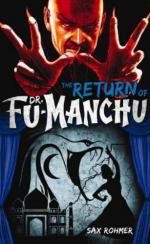Smith sprang upright again and turned to me.
“Either I am growing over-credulous,” he said, “or Aziz speaks the truth. But”—he held up his hand—“you can tell me all that at some other time, Petrie! We must take no chances. Sergeant Carter is downstairs with the cab; you might ask him to step up. He and Aziz can remain here until our return.”
CHAPTER XXVIII
THE SAMURAI’S SWORD
The muffled drumming of sleepless London seemed very remote from us, as side by side we crept up the narrow path to the studio. This was a starry but moonless night, and the little dingy white building with a solitary tree peeping, in silhouette, above the glazed roof, bore an odd resemblance to one of those tombs which form a city of the dead so near to the city of feverish life on the slopes of the Mokattam Hills. This line of reflection proved unpleasant, and I dismissed it sternly from my mind.
The shriek of a train-whistle reached me, a sound which breaks the stillness of the most silent London night, telling of the ceaseless, febrile life of the great world-capital whose activity ceases not with the coming of darkness. Around and about us a very great stillness reigned, however, and the velvet dusk which, with the star-jeweled sky, was strongly suggestive of an Eastern night—gave up no sign to show that it masked the presence of more than twenty men. Some distance away on our right was the Gables, that sinister and deserted mansion which we assumed, and with good reason, to be nothing less than the gateway to the subterranean abode of Dr. Fu-Manchu; before us was the studio, which, if Nayland Smith’s deductions were accurate, concealed a second entrance to the same mysterious dwelling.
As my friend, glancing cautiously all about him, inserted the key in the lock, an owl hooted dismally almost immediately above our heads. I caught my breath sharply, for it might be a signal; but, looking upward, I saw a great black shape float slantingly from the tree beyond the studio into the coppice on the right which hemmed in the Gables. Silently the owl winged its uncanny flight into the greater darkness of the trees, and was gone. Smith opened the door and we stepped into the studio. Our plans had been well considered, and in accordance with these, I now moved up beside my friend, who was dimly perceptible to me in the starlight which found access through the glass roof, and pressed the catch of my electric pocket-lamp . . .
I suppose that by virtue of my self-imposed duty as chronicler of the deeds of Dr. Fu-Manchu—the greatest and most evil genius whom the later centuries have produced, the man who dreamt of an universal Yellow Empire—I should have acquired a certain facility in describing bizarre happenings. But I confess that it fails me now as I attempt in cold English to portray my emotions when the white beam from the little lamp cut through the darkness of the studio, and shone fully upon the beautiful face of Karamaneh!




